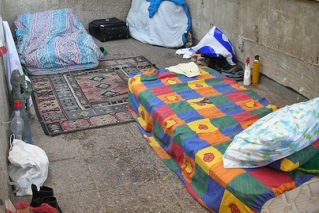 CC-BY-NC-SA Yoav Lerman
CC-BY-NC-SA Yoav LermanTel Aviv District Court in a precedent-setting ruling: municipal inspectors are not allowed to evict homeless people from public spaces; confiscation of their personal belongings – only under special circumstances.
In a precedent-setting ruling granted today (19 November 2012), Tel Aviv District Court Judge Dr. Michal Agmon-Gonen accepted a petition submitted by three homeless persons and by the Association for Civil Rights in Israel (ACRI) against the Tel Aviv Municipality’s activities to evict homeless people from open public spaces and to confiscate their belongings. The ruling establishes that, in the cases presented, the municipal inspectors acted disproportionately, and instructs the municipality to formulate regulations for protecting the public space without disproportionately harming the rights of homeless people.
From the ruling:
“I accept the petition and instruct the Tel-Aviv-Jaffa Municipality to not remove homeless people or cause them to leave public spaces, and to not take equipment they require for daily living, such as sleeping equipment and personal documents, except under circumstances in which there is an objective basis to assume that the equipment is abandoned or creates actual concern for a significant sanitary hazard or nuisance, or poses an immediate threat to public health or security.”
“If the municipality prepares a procedure detailing the manner of activation of the authority, the municipality will act in accordance with the said procedure, which, naturally, will be tested according to the rules of administrative law.”
The ruling includes important statements concerning the protection of the human rights of homeless people:
“While presence in the public space does not constitute a ‘vital service’ for a person who has personal property, and a park serves him solely for leisure and entertainment, it certainly constitutes a vital service for homeless people, who reside in the public space and subsist in it […] In these cases, the strong groups must show tolerance, even if their enjoyment of the public domain is slightly restricted, in order to enable the homeless to live in dignity in the public space.”
“The exclusion of homeless people from the public space threatens their very existence […] If there is no place in which I can perform an action, it means I have no right to perform it. Since homeless people perform all actions in the public space, excluding them from it denies their right to exist.”
The ruling also mentions ACRI’s role in court petitions on behalf of disadvantaged populations:
“Disadvantages groups in society face numerous obstacles in realizing their rights. In fact, the only way they manage to bring their case before the court is through others, often organizations such as Petitioner 1, the Association for Civil Rights in Israel […] ACRI brought the voice of homeless people to the court, it enabled them to overcome the social hurdles and obstacles.”
The petition was filed in October 2011, when – alongside the eviction of the social protest tents – ACRI received complaints from homeless people describing their daily harassment by municipal inspectors and their eviction from public spaces in the city, where they were sleeping. The Tel Aviv Municipality initially claimed that the eviction was part of the actions taken to evict the protest tents. Later, the municipality claimed that its actions were intended to implement municipal by-laws for maintaining order and cleanliness.
According to ACRI Attorney Gil Gan-Mor, “The ruling granted today sends a clear message to the Tel Aviv Municipality and to all the local authorities in Israel: Homeless people also have the right to live in safety in the public space and the right to dignity, and they must not be harassed. The treatment of homeless people by the Israeli authorities lis decades behind the policies implemented in developed countries. I hope that instead of harassment, we will start to see an effective and committed policy designed to help the homeless and to implement their rights.”
To read the complete ruling (in Hebrew), click here.
The petition was prepared and submitted by ACRI Attorneys Gil Gan-Mor, Dan Yakir, Tali Nir, and Nira Shalev.







